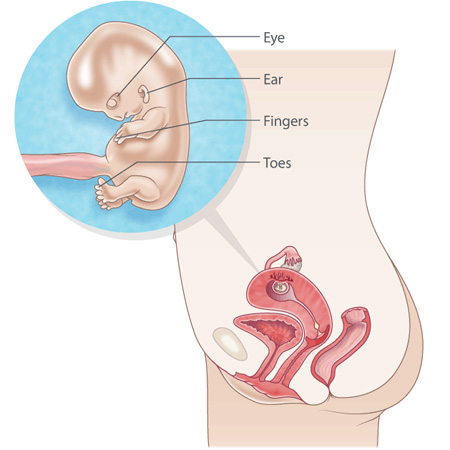
Week 10 of Pregnancy: A Comprehensive Guide
Pregnancy is a transformative journey that encompasses numerous physical, emotional, and hormonal changes. As you progress through each week, your body undergoes remarkable adaptations to support the growth and development of your baby. Week 10 of pregnancy marks a significant milestone, as it signifies the completion of the embryonic stage and the beginning of the fetal stage.
Fetal Development: From Embryo to Fetus
During week 10, your baby transitions from being an embryo to a fetus. This transition is characterized by the formation of distinct facial features, including the eyes, nose, and mouth. The limbs, which were previously bud-like structures, begin to elongate and take on a more human-like appearance. Fingers and toes become visible, and the baby’s movements become more coordinated.
Physical Changes in the Mother
As your baby grows, your body continues to adapt to accommodate the increasing demands of pregnancy. The most noticeable physical change during week 10 is the expansion of your uterus. This expansion can cause your abdomen to become slightly distended and your waistline to thicken.
Other physical changes that may occur during week 10 include:
- Breast tenderness and enlargement: Your breasts will continue to grow and become more tender as they prepare for breastfeeding.
- Increased urination: As your uterus expands, it can put pressure on your bladder, leading to more frequent urination.
- Fatigue: Pregnancy hormones can cause you to feel tired and fatigued, especially during the first trimester.
- Morning sickness: Although morning sickness typically subsides by week 10, some women may still experience nausea and vomiting.
- Food cravings and aversions: Your changing hormones can affect your sense of taste and smell, leading to cravings for certain foods and aversions to others.
Emotional Changes
The hormonal fluctuations during pregnancy can also affect your emotional state. During week 10, you may experience:
- Mood swings: Your emotions can fluctuate rapidly, from feeling happy and excited to feeling sad and anxious.
- Increased sensitivity: You may become more sensitive to criticism or emotional triggers.
- Difficulty concentrating: Pregnancy hormones can affect your ability to focus and concentrate.
- Increased anxiety: Some women may experience increased anxiety during pregnancy, especially during the first trimester.
Prenatal Care
Regular prenatal care is essential for monitoring the health of both you and your baby. During your week 10 prenatal appointment, your healthcare provider will typically perform the following:
- Physical exam: Your provider will check your weight, blood pressure, and overall health.
- Fetal heartbeat check: Your provider will use a Doppler ultrasound to listen to your baby’s heartbeat.
- Blood tests: Blood tests may be ordered to check your blood count, hormone levels, and infection status.
- Ultrasound: An ultrasound may be performed to confirm your baby’s gestational age and assess their growth and development.
Lifestyle Modifications
As you progress through your pregnancy, it is important to make healthy lifestyle modifications to support your health and the well-being of your baby. During week 10, consider the following:
- Nutrition: Eat a healthy diet that includes plenty of fruits, vegetables, whole grains, and lean protein. Avoid raw or undercooked meat, fish, and eggs.
- Exercise: Engage in regular moderate-intensity exercise, such as walking, swimming, or prenatal yoga.
- Hydration: Drink plenty of fluids, especially water, to stay hydrated.
- Sleep: Aim for 7-9 hours of sleep each night.
- Stress management: Find healthy ways to manage stress, such as yoga, meditation, or spending time in nature.
- Avoid alcohol and smoking: Alcohol and smoking can harm your baby’s development.
Common Concerns
Week 10 of pregnancy is generally considered a time of relative stability, but there are some common concerns that you may encounter:
- Vaginal bleeding: Any vaginal bleeding during pregnancy should be reported to your healthcare provider immediately.
- Abdominal pain: Mild abdominal pain is common during pregnancy, but severe or persistent pain should be evaluated by your provider.
- Fever: A fever during pregnancy can indicate an infection, which should be treated promptly.
- Preeclampsia: This condition, characterized by high blood pressure and protein in the urine, can develop during pregnancy.
Conclusion
Week 10 of pregnancy marks a significant milestone in your journey. Your baby has transitioned from an embryo to a fetus, and your body is undergoing remarkable changes to support their growth and development. By understanding the physical, emotional, and lifestyle changes that occur during this week, you can make informed decisions to ensure the health and well-being of both you and your baby. Regular prenatal care and a healthy lifestyle are essential for a successful pregnancy.